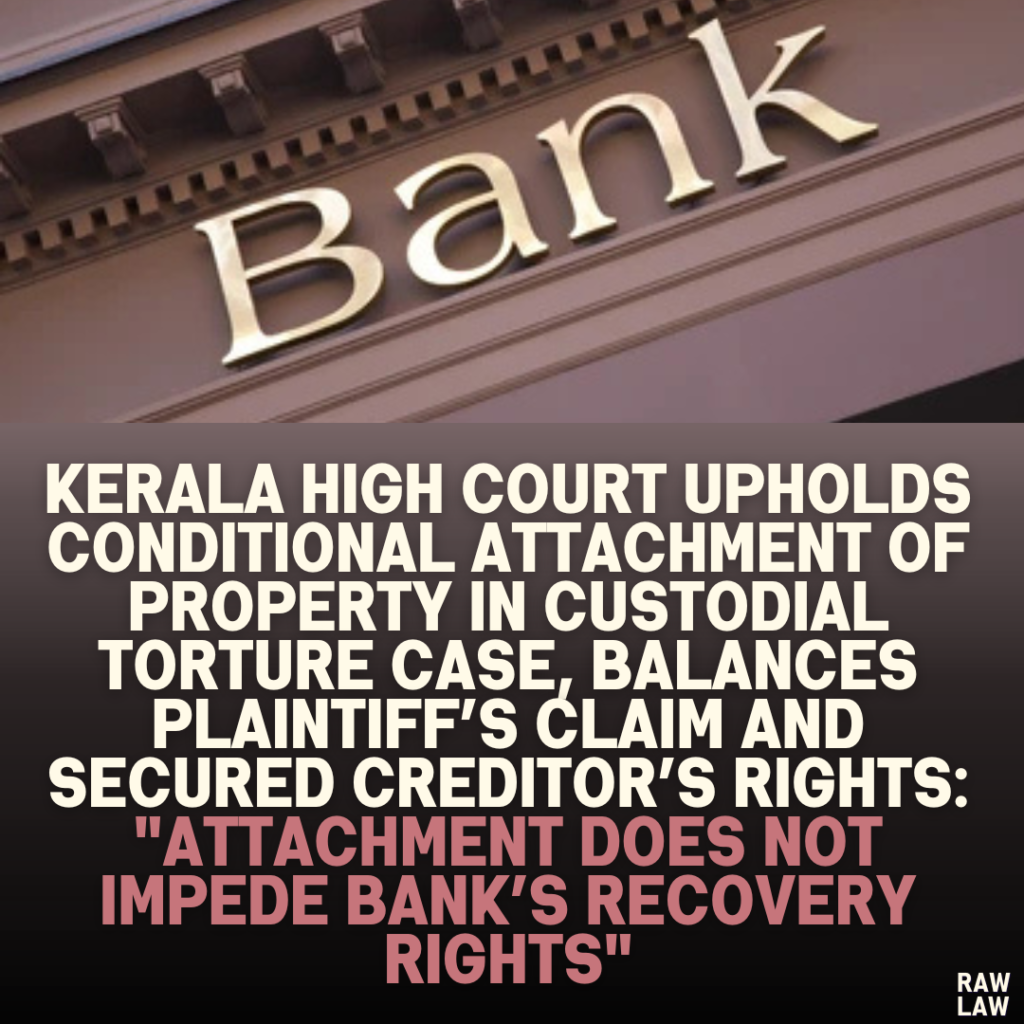Court’s Decision:
The Kerala High Court dismissed the appeal filed by the appellant (sixth defendant in the original suit) challenging the conditional attachment order of their property. The court upheld the Sub Court’s decision to make the attachment absolute, clarifying that the attachment would not impede the rights of the secured creditor (the bank) to recover the loan amount in case of default by the appellant.
Facts:
- The first respondent (plaintiff) filed a suit in the Sub Court, Karunagappally, seeking damages of ₹25,00,000 for alleged custodial torture, which was claimed to have been inflicted by police officers, including the appellant, who was serving as a Sub Inspector at the relevant time.
- The trial court directed the appellant to furnish security for the suit amount or face attachment of the property listed as Item No. 2 in the case documents. A conditional attachment was placed on the property.
- Subsequently, the trial court made the attachment absolute on January 31, 2024, after hearing both sides.
- The appellant filed an appeal, contending that the attachment order adversely impacted their existing loan with the bank, as the property was already pledged as security.
Issues:
- Was the trial court’s decision to impose and confirm a conditional attachment order on the appellant’s property justified?
- Did the attachment order interfere with the rights of the secured creditor (bank) over the property?
Petitioner’s (Appellant’s) Arguments:
- The appellant argued that the attachment order over the property caused undue hardship. The bank, where the property was pledged as security for a loan, threatened to recall the loan and initiate recovery proceedings.
- The appellant contended that the bank’s action could ultimately harm the first respondent’s chances of recovering damages if they succeeded in the case, as the bank might sell the property before the decree was executed.
Respondent’s (First Respondent/Plaintiff’s) Arguments:
- The first respondent alleged that the appellant had been attempting to alienate the property, potentially frustrating the execution of any decree in their favor.
- It was argued that the attachment order was necessary to secure the respondent’s claim and prevent the appellant from disposing of the property.
Analysis of the Law:
- Attachment and Secured Creditors:
- The court noted that the property in question was already pledged to the bank before the institution of the suit. Therefore, the bank’s rights as a secured creditor could not be overridden by the attachment order.
- Legal principles establish that an attachment order does not create ownership rights but merely prevents the alienation of the property to safeguard the interests of the plaintiff.
- Protection of Plaintiff’s Interests:
- The attachment order serves as a mechanism to ensure that the property remains available for execution if the plaintiff obtains a favorable decree.
- Such orders prevent the defendant from disposing of or alienating assets that might otherwise be used to satisfy the judgment.
Precedent Analysis:
The court reiterated established principles that:
- Attachment orders are preventive measures aimed at safeguarding the plaintiff’s interests.
- Secured creditors retain their rights over pledged properties, even if such properties are subject to attachment orders.
Court’s Reasoning:
- Prima Facie Case:
- The trial court had found that a prima facie case existed against the appellant, warranting the attachment of the property to prevent its alienation.
- The plaintiff was likely to succeed in the suit based on the evidence presented.
- Impact on the Bank:
- The court dismissed the appellant’s apprehension that the attachment order would affect the bank’s ability to recover the loan.
- The bank’s right to proceed against the property in the event of default remained intact, unaffected by the attachment order.
- Balance of Interests:
- The attachment provided security for the plaintiff’s potential claim without infringing upon the bank’s rights.
Conclusion:
The High Court dismissed the appeal, finding no merit in the appellant’s contention that the attachment order caused irreparable harm. The court clarified that:
- The attachment order would not hinder the bank’s ability to recover the loan amount if the appellant defaulted.
- The plaintiff’s claim was safeguarded by preventing the alienation of the property.
Implications:
- Protection of Plaintiff’s Claims:
- The decision underscores the court’s commitment to protecting the plaintiff’s interests in civil suits by ensuring that potential judgment debts can be recovered.
- Clarification on Secured Creditors’ Rights:
- The judgment reaffirms that secured creditors’ rights are paramount and remain unaffected by civil attachment orders.
- Legal Safeguards Against Alienation:
- Defendants cannot frustrate the execution of a decree by disposing of attached properties, ensuring a balance between competing interests.




Pingback: Bombay High Court Upholds Demolition of Unauthorized Constructions on Government Land, Rules “Illegality is Incurable” and Cannot Be Regularized Despite Innocent Purchasers’ Claims - Raw Law